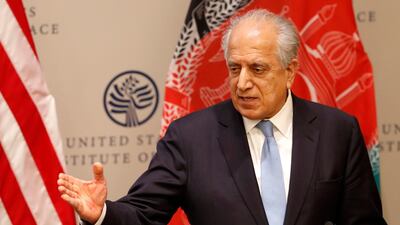US Afghanistan peace envoy Zalmay Khalilzad continued his visit to Pakistan on Tuesday as the US stated support for China-led talks to negotiate an end to Afghanistan’s 18-year war.
Mr Khalilzad met with Pakistan’s Prime Minister Imran Khan on Monday and the country’s powerful military chief on Tuesday.
Meanwhile Taliban representatives were due in Beijing to begin a peace effort supported by Pakistan, Russia, the US and China.
Although the group had confirmed the date of the dialogue for October 29-30, on Monday an insurgent spokesman denied a report that said a Taliban delegation was in Beijing.
The Chinese government also failed to confirm the talks when asked at a regular press briefing on Tuesday, but said it would support an "Afghan-owned peace and reconciliation process".
"China is willing to provide facilitation and assistance to promote the Afghan peace and reconciliation process, including internal Afghan dialogue and negotiation, on the basis of respect for the wishes of all parties," said foreign ministry spokesman Geng Shuang.
The Taliban have refused to negotiate formally with the Kabul government, but the Beijing and Doha gatherings are seen as fostering dialogue and planting the seeds of an eventual brokered solution.
A statement from Russia, China, the US and Pakistan following a meeting in Moscow last week "welcomed the Chinese proposal to host the next intra-Afghan meeting in Beijing”.
The talks, if they occur, will include "a wide range of political figures" including "representatives of the government of the Islamic Republic of Afghanistan, other Afghan leaders and the Taliban," they said.
The US has welcomed China’s offer to host talks between Afghan officials and the Taliban following the collapse of its own attempt in September.
China shares a 76-kilometre border with Afghanistan and has voiced concern about the spread of extremism, while the Soviet Union in the 1980s led a disastrous intervention in the country against guerrillas then backed by Washington.
Ahead of the slated China talks, Afghan government officials called for the group to institute a one-month ceasefire to prove they still control their forces.
Hamdullah Mohib, a strong critic of earlier US-Taliban negotiations that excluded his government, said the Taliban no longer operate as a cohesive body and some commanders may have joined the Islamic State group.
"If the Taliban really want peace, they should prove how much control they have over their commanders and how much they really obey their commands," Mohib said at a press conference.
"Our suggestion is for a one-month ceasefire, followed by negotiations."
Mr Khalilzad’s visit to Pakistan raised hopes of a US re-engagement in the process.
The Taliban political spokesman Suhail Shaheen said last week that if the U.S. were to go back and sign the nearly imminent deal with the Taliban, there would be a cease-fire first with U.S. and NATO troops, followed by a negotiated cease-fire between the insurgents and Afghan forces.
“If the U.S. returns to the negotiating table and signs the agreement, then there will be a cease-fire and reduction of violence,” Shaheen said.

